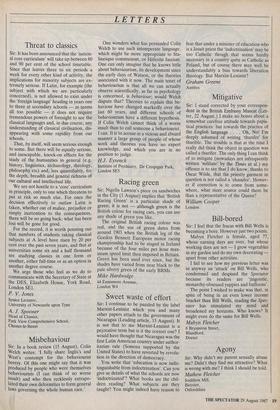LETTERS Threat to classics
Sir: It has been announced that the 'nation- al core curriculum' will take up between 80 and 90 per cent of the school timetable. Since that leaves three to six periods a week for every other kind of activity, the implications for minority subjects are ex- tremely serious. If Latin, for example (the subject with which we are particularly concerned), is not allowed to exist under the 'foreign language' heading in years one to three at secondary schools — as seems all too possible — it does not require tremendous powers of foresight to see the classical languages and, in due course, any understanding of classical civilisation, dis- appearing with some rapidity from our schools.
That, by itself, will seem serious enough to some. But there will be equally serious, and inescapable, knock-on effects for the study of the humanities in general (e.g. history, linguistics, archaeology, theology, philosophy etc) and, less quantifiably, for the depth, breadth and general richness of our cultural and intellectual life.
We are not hostile to a 'core' curriculum in principle, only to one which threatens to put at risk so much else. For once the decision effectively to outlaw Latin is taken, whether out of malice, prejudice or simply inattention to the consequences, there will be no going back: what has been lost will be gone for good.
For the record, it is worth pointing out that numbers of students taking classical subjects at A level have risen by 20 per cent over the past seven years, and that at universities some six and a half thousand are studying classics in one form or another, either full-time or as an option in another degree course.
We urge those who feel as we do to communicate with the Secretary of State at the DES, Elizabeth House, York Road, London SE1.
P. V. Jones
Senior Lecturer, University of Newcastle upon Tyne
A. J. Spooner
Head of Classics, Park View Comprehensive School, Chester-le-Street










































 Previous page
Previous page